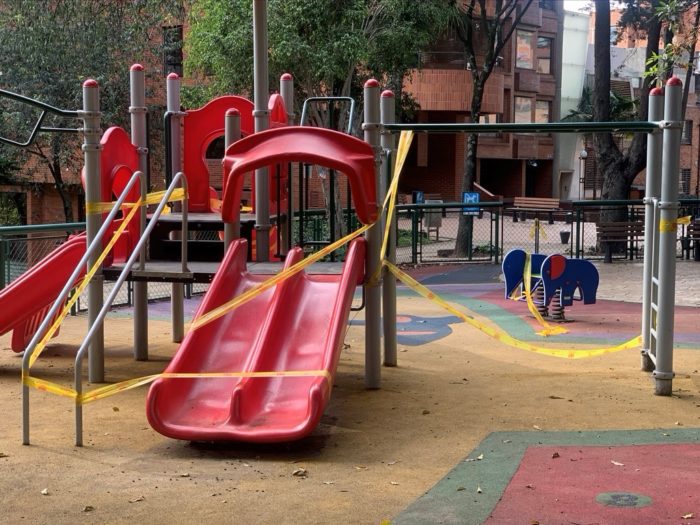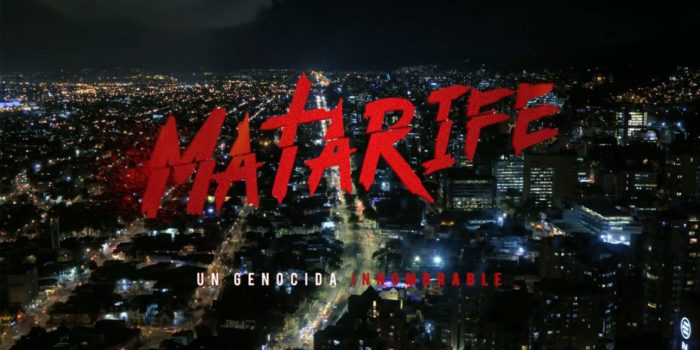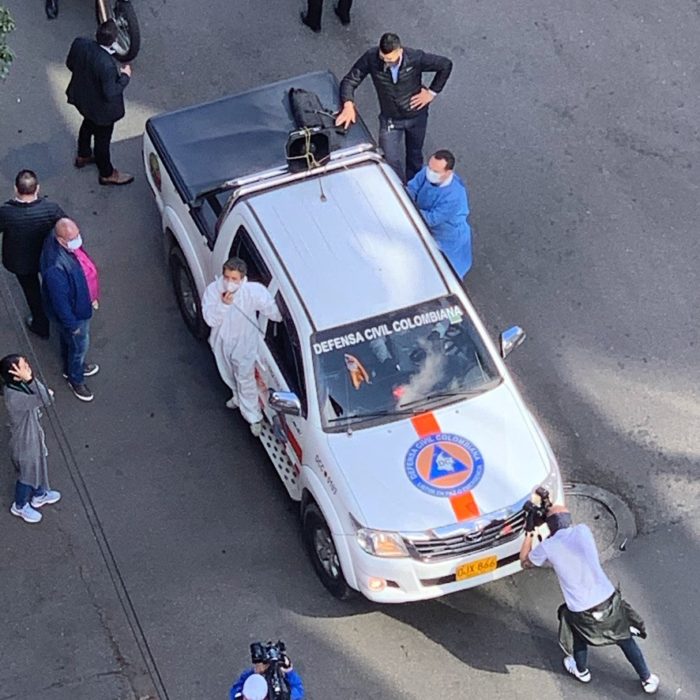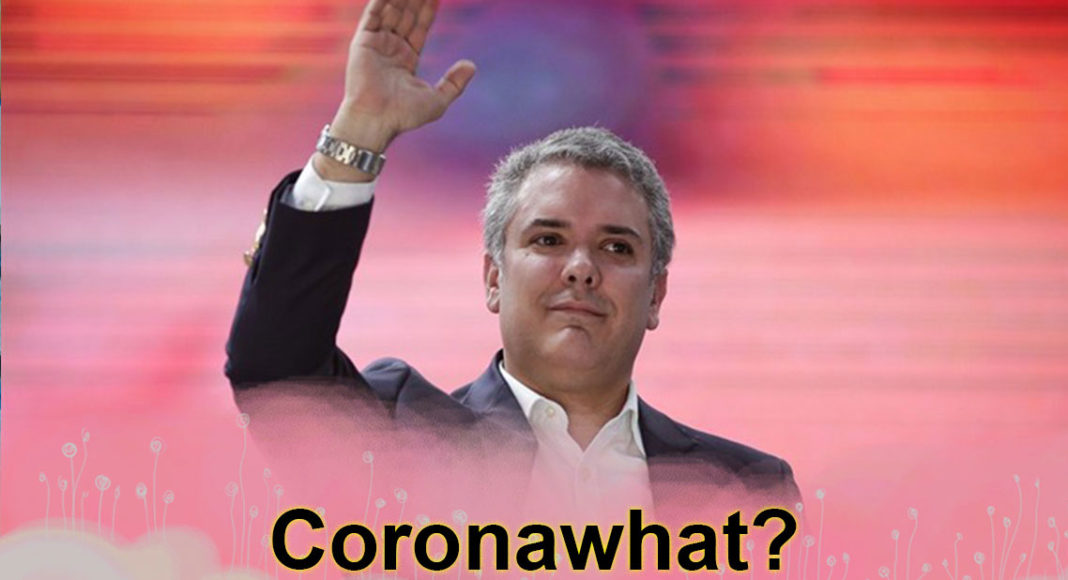Every day at 5pm, give or take half an hour, the figures detailing the numbers of fatalities, recoveries and new cases of Covd-19 become available and then at 6pm for an hour, Colombia’s President Ivan Duque provides a televised address to the nation. The President, seated beside props of generic and unused hand sanitizer and a clear plastic medical face shield, sells an unconvincing image of authority to a fatigued Colombian public. His air of faux-confidence does not conceal the reality that Covid-19 in Colombia passed the 1000-person fatality mark in early June. This slickly produced and televised advertorial content, highlighting his government’s successes in the regions, seems opportunistic rather than fact-based.

These nightly broadcasts are but trivial marginal notes in the narrative of Colombia’s present suffering. There’s no taking away from the fact that, as of 4 June, 47 social or community leaders across the country have been assassinated and no amount of polished television in the style of former Venezuelan President Hugo Chavez’s Alo Presidente can erase this, even after more than ten weeks of quarantine.
Long before the pandemic struck, the Economist had suggested in June 2019 that President Duque had still to emerge from the tall shadow of his political sponsor, former president and now senator, Alvaro Uribe. There is little evidence that President Duque has convinced naysayers that he is capable of autonomous action, and his detractors refer to him as the ‘subpresidente’. His decision to militarize the country’s Amazonian outpost of Leticia, instead of sending urgently needed medical supplies and personnel to combat a tragically rapid spread of Covd-19, reinforces his starkly uribista bent.

It’s widely acknowledged that Duque is a weak president, despite enjoying majority support in congress and having stacked his inner circle with uribista hardliners. Because of his political inexperience, his management of the top job has been in question since he took office in 2018. Then, November 2019 saw over a month of almost daily protests against his government, with many thousands of citizens marching for dozens of causes. The strongest voices were those in favour of the peace accords, against the killings of social leaders and against proposed economic reforms. Demonstrations were galvanized by the killing of a student protestor by a riot policeman.
Duque’s reluctance to make changes to bridge ideological differences with the opposition has reflected in startlingly poor showings in the polls, despite his government’s £740,000 contract to improve his image on social media. Despite doubts as to whether the president was capable of concerting an adequate response to the pandemic, public opinion has been supportive, although patience is now running out.
As Adriaan Alsema writes in Colombia Reports, ‘No government in the history of the humanity has been able to adequately respond to a pandemic as they are ungovernable by nature and per definition disruptive. Like in many societies, the coronavirus has exacerbated pre-existing social ills. In Colombia, this has made the weakness of state institutions, classism, corruption and a general disregard for human life painfully visible’.
At the beginning of the pandemic, Duque’s authority was brusquely challenged when the country’s regional politicians acted against the orders he had issued in March, moving to lockdown their cities and departments, in spite of the known economic risks.
Bogotá’s mayor Claudia López blindsided the president on several occasions, with strong and clear decisions which highlighted his vacillations. Opponents of López claim that the mayor overstepped her authority and that her actions were just part of the political competition between her and president. Her supporters point to her proactive management of the situation in the city which has by far the largest concentration of Covid-19 cases in the country.

However, López’ reputation has been tarnished by two actions in particular: she took the extraordinary decision to clear shanty-towns in parts of southern Bogotá, thus displacing the already displaced; and she ordered the complete shut-down and quarantine of the working-class district of Kennedy, which had the city’s highest rate of growth in new Covid infections. On 4 June, López was called before a virtual session of congress and subjected to a barrage of partisan questions to which she answered in a typically articulate, if defensive, manner.
‘In every capital city we have a high population density and with the international airport, we have been the most affected. The national Government’s handling of the airport was calamitous. The whole country was calling for a cessation of international flights from February and the airport remained open to benefit one business,’ said López.
Although 43 key professions have received an all-clear to return to work, by the time the quarantine is lifted on 30 June, Colombians will have endured 102 days of a lockdown where there appears to be no ‘flattening of the curve’. It is widely understood that Colombia’s unrelenting lockdown was put in place not just to prevent the imminent collapse of the healthcare system, but that of the state itself. Yet there appears to be no plan in place for further action beyond riding out the quarantine. While President Duque tries to convince the Colombian population that the numbers of ‘recovered’ patients are a major positive, red rags, signifying hunger, hang in windows in poorer neighbourhoods. Moreover, as numbers of recorded cases of the virus continue to rise, Colombians are aware that low testing numbers, poor to zero health coverage in rural areas and invasiones of the cities, mean that the true rate may be significantly higher.
Main image: from Colombia Reports
Richard McColl has been an expedition guide, social projects coordinator and freelance journalist living in Bolivia, Brazil, Ecuador and Peru. Now settled in Colombia, he runs a guesthouse, writes books and articles and has his own regular podcast, Colombia Calling. He is the author of LAB’s forthcoming title Colombia Inside Out.

